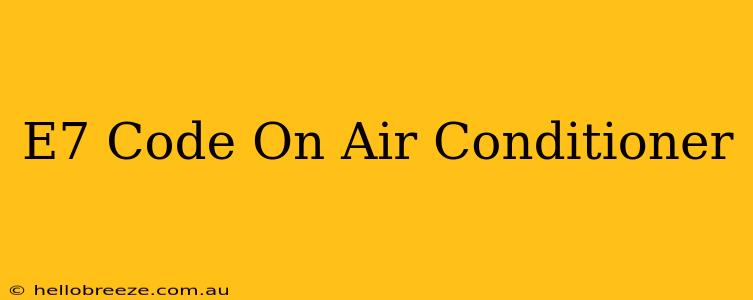Is your air conditioner displaying the dreaded E7 error code? Don't panic! This common error usually points to a specific problem that can often be solved without calling a pricey HVAC technician. This guide will walk you through understanding the E7 error code, its likely causes, and how to troubleshoot and fix the issue.
Understanding the E7 Error Code
The meaning of the E7 error code can vary slightly depending on your air conditioner's brand and model. However, it generally indicates a problem with the refrigerant system. Refrigerant is the crucial substance that absorbs heat from your home and releases it outside. An E7 error often suggests a refrigerant leak or a low refrigerant level.
What Causes the E7 Error Code?
Several factors can lead to an E7 error code on your air conditioner. The most frequent causes include:
-
Refrigerant Leak: This is the most common culprit. A small hole or crack in the refrigerant lines can cause a gradual leak, eventually leading to a low refrigerant level and triggering the E7 error. These leaks can be difficult to detect visually, often requiring specialized equipment.
-
Low Refrigerant Charge: Even without a leak, your system might have a low refrigerant charge due to improper installation or a previous repair.
-
Compressor Issues: In some cases, problems with the compressor (the heart of your AC unit) can indirectly trigger an E7 code. A failing compressor might not circulate refrigerant efficiently, leading to a low-pressure reading that results in the error code.
-
Clogged Filter: While less common, a severely clogged air filter can restrict airflow, affecting pressure within the system and potentially resulting in the E7 error. This is usually a more indirect cause.
-
Faulty Refrigerant Lines: Damaged or corroded refrigerant lines can also contribute to leaks and trigger the E7 code. Visual inspection might reveal external damage.
Troubleshooting the E7 Error Code
Before calling an HVAC technician, try these troubleshooting steps:
1. Check the Air Filter
Start by checking your air conditioner's air filter. A clogged filter restricts airflow, impacting the system's efficiency. Replace or clean the filter. If the E7 error persists, move to the next step.
2. Check for Obstructions
Ensure there are no obstructions blocking airflow around the outdoor unit. Clear any debris, leaves, or other objects that might restrict airflow. Proper airflow is crucial for efficient operation.
3. Listen for Unusual Noises
Pay attention to any unusual noises coming from your air conditioner, especially from the outdoor unit. Unusual sounds like hissing or rattling can indicate a refrigerant leak or a compressor problem.
4. Professional Inspection (Necessary)
If the E7 error persists after trying the above steps, it's essential to call a qualified HVAC technician. The E7 error almost always requires professional attention due to the complexity of the refrigerant system. A technician will use specialized equipment to:
- Detect Refrigerant Leaks: Using leak detection tools, they can pinpoint the exact location of any leaks.
- Check Refrigerant Levels: They'll measure the refrigerant level and determine if it's sufficient.
- Repair or Replace Components: Depending on the cause, they might need to repair damaged lines, replace parts (such as the compressor), or recharge the refrigerant.
Preventing Future E7 Errors
To minimize the risk of future E7 errors:
- Regular Maintenance: Schedule regular professional maintenance to ensure your air conditioner is running efficiently. This includes checking refrigerant levels and inspecting for leaks.
- Clean Air Filter Regularly: Change or clean your air filter at least once a month, or more often if you have pets or allergies.
- Inspect Outdoor Unit: Regularly inspect the outdoor unit for obstructions and damage.
The E7 error code is a serious issue and shouldn't be ignored. While some preliminary troubleshooting can be attempted, professional help is usually necessary to identify and resolve the underlying problem safely and effectively. Remember, dealing with refrigerant requires specialized knowledge and equipment. Don't attempt repairs yourself unless you have the proper training and certification.

